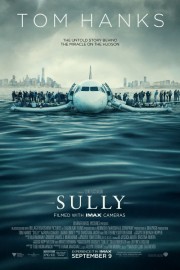Sully
I’m not sure that Clint Eastwood has ever told a story in as short a time as he does in “Sully.” At 96 minutes, it is certainly the shortest film I think I have ever seen of his, but it’s also some of his most compelling work. I really do hope to see this in the IMAX format that he filmed it with, because I feel like his classical framing (as seen by longtime cinematographer Tom Stern) as seen through the IMAX camera would be one of his finest visual achievements in his 40-plus years as a director as he recreates the 2009 “Miracle on the Hudson.” (I had forgotten that it was so recent, actually.) It hits a lot of the typical “heroic biopic” story beats we saw in his last film, “American Sniper,” but there’s something about the story of Chesley ‘Sully’ Sullenberger, the US Airways pilot who had to make an emergency landing in the Hudson River when a bird flock encounter left him and his co-pilot, Jeff Skiles, without either engine, and no way to get themselves or the other 153 people on the flight back to an airport runway. His quick actions under pressured saved them all, but when investigators call into question whether he really had no other choice, doubt seems to seep in. Did he make the best choice? Was it the only choice?
The flight, and its aftermath, are all seen through Sullenberger’s perspective, and it’s to the film’s immense benefit that Eastwood cast Tom Hanks in the role. What we get isn’t the same as Hanks’s last “captain in crisis” film, “Captain Phillips,” but much more internal. The script by Todd Komarnicki looks at these events through the very specific prism of a man who has been flying for over 40 years, has had many successful flights, but all of the sudden, is thrown into the spotlight because of how he used his experience to do something no one else has been able to do. Now, while the rest of the world hails him a hero, people who are in his field call that into question, which makes him go back into his memory banks, and almost have to reassure himself that yes, he did the only thing he could do. Hanks does very good work here in some of the most psychologically intense work he’s done since “Cast Away.” He gets able support from Aaron Eckhart as Skiles and Laura Linney as his worried wife, whom he only talks to on the phone, but this is Hanks and Eastwood’s show, and they bring this in for a smooth landing. I don’t know if it has quite the power of recent Eastwood films like “Gran Torino” or “Changeling” or “Million Dollar Baby,” but it has the director working in strong form, on a visual scale we haven’t really seen before. He still knows how to tell a story, and grab us with his gifts as a filmmaker.










